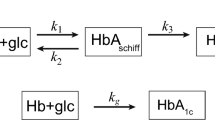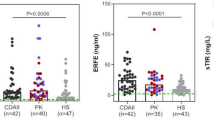Abstract
So far there has been no report in the literature suggesting that the chemical composition of the red blood cell changes during the life of an adult healthy human. We have now obtained evidence that in a normal population the red cell concentration of 2,3-diphosphoglycerate (2,3-DPG) decreases with advancing age. 2,3-DPG is an intermediary metabolite in the Embden–Meyerhof glycolytic pathway in the red cells, which affects haemoglobin affinity for oxygen. Elevated concentration of 2,3-DPG decreases the affinity and thus increases the fraction of haemoglobin-bound oxygen available to the tissues, and decreased concentration of 2,3-DPG has the opposite effect1,2. In general, an increase in the red cell 2,3-DPG is found in response to hypoxia or anaemia and a decrease of 2,3-DPG is caused by acidosis3,4.
This is a preview of subscription content, access via your institution
Access options
Subscribe to this journal
Receive 51 print issues and online access
$199.00 per year
only $3.90 per issue
Buy this article
- Purchase on Springer Link
- Instant access to full article PDF
Prices may be subject to local taxes which are calculated during checkout
Similar content being viewed by others
References
Benesch, R., and Benesch, R. E., Biochem. biophys. Res. Commun., 26, 162–167 (1967).
Chanutin, A., and Curnish, R. R., Archs Biochem. Biophys., 121, 96–102 (1967).
Oski, F. A., and Gottlieb, A. J., in Progress in Haematology (edit. by Brown, E. B., and Moore, C. V.), 7, 33–67 (Grune and Stratton, New York and London, 1971).
Bellingham, A. J., and Grimes, A. J., Br. J. Haemat., 25, 555–562 (1973).
A Nutrition Survey of the Elderly (Her Majesty's Stationery Office, London, 1972).
Hamilton, J. B., Bunch, L., and Hirschman, A., J. clin. Endocr. Metab., 16, 463–472 (1956).
Lichtman, M. A., and Miller, D. R., J. Lab. clin. Med., 76, 267–279 (1970).
Travis, S. F., Sugerman, H. J., Ruberg, R. L., Dudrick, S. J., Delivoria-Papadopoulos, M., Millar, L. D., and Oski, F. A., New Eng. J. Med., 285, 763–768 (1971).
Lichtman, M. A., Miller, D. R., Cohen, J., and Waterhouse, C., Ann. intern. Med., 74, 562–568 (1971).
Card, R. T., and Brain, M. C., New Eng. J. Med., 288, 388–392 (1973).
Valeri, C. R., and Collins, F. B., Vox Sang., 20, 397–403 (1971).
Young, J. A., Lichtman, M. A., and Cohen, J., Circulation, 47, 1313–1318 (1973).
Birnstingl, M., Cole, P., and Hawkins, L., Br. J. Surg., 54, 615–619 (1967).
Grisolia, A., Moore, K., Lugne, J., and Grady, H., Analyt. Biochem., 31, 235–245 (1969).
Author information
Authors and Affiliations
Rights and permissions
About this article
Cite this article
PURCELL, Y., BROZOVIĆ, B. Red cell 2,3-diphosphoglycerate concentration in man decreases with age. Nature 251, 511–512 (1974). https://doi.org/10.1038/251511a0
Received:
Issue Date:
DOI: https://doi.org/10.1038/251511a0
This article is cited by
-
Relationship between routine hematological parameters, serum IL-3, IL-6 and erythropoietin and mild anemia and degree of function in the elderly
Aging Clinical and Experimental Research (1998)
-
The anemia of childhood revisited
Blut (1987)
Comments
By submitting a comment you agree to abide by our Terms and Community Guidelines. If you find something abusive or that does not comply with our terms or guidelines please flag it as inappropriate.



